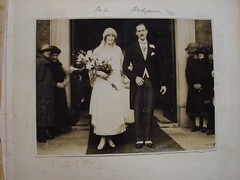It’s not just the sins of the fathers that get visited on following generations. In Granny’s experience, the deaths of the mothers are dumped on them still harder.
In previous generation this was of course much more common than now. Before the twentieth century few women lived long enough to be grandmothers. Too many of them died in childbirth, or else worn out by overwork. But Granny’s family has seen the story persist.
About one early death she only learned recently, with the help of the internet and the British Library. That is the death of her great grandmother, Frances, aged 31, when her grandmother was only 9. (Frances had lost her mother, aged 48, eight years before – but at least she was more or less grown up by then, unlike her younger sisters. But that is another story.) The reason Granny knew so little about any of this – till her research she did not even know her great grandmother’s name – was that her grandfather – Granny’s great grandfather – took a second wife, an American called Betty, who did her best to obliterate the previous marriage and its one offspring, Granny’s grandmother. After her stepdaughter’s death she even succeeded in persuading her husband to remove the equal billing given, in his will, to his son by her and the daughter from his first marriage – and, after her death, to her children, his grandchildren, Granny’s mother and aunt. (But for that Granny's mother would have been a rich woman; so might she be; richer anyway. Not that it matters.)
The American did more than that. Granny’s great grandfather was a notable enough man - an MP, among other things. Finding him in the records is not difficult. Yet not one of them refers to his first marriage, to his daughter, let alone to his descendents by her, only to his second wife and her son and granddaughter. (This son, Granny, must add, paid her mother’s wedding. Big deal. Charity to a poor relation, who, but for his mother, wouldn’t have been.)
How to obliterate women from history in one easy lesson.
Her mother hated her American step-grandmother – and not simply for this. She seems to have been an unpleasant woman altogether. But she did tell Granny one astonishing fact about her; that she NEVER IN HER WHOLE LIFE WASHED HER HAIR. Instead, every night and every morning, for half an hour, she had it brushed by her maid, thereby saving a great deal on soap (shampoo didn’t exist then.) The hair-brushing maid would have had the job anyway. She would have been paid a lot less no doubt than we spend on our hair now. Still, reader; take this advice. If you want to save on the wages of the maid, let alone on the stuff that can give you more than one orgasm if you use it right (according to one recent commercial)BRUSH YOUR OWN HAIR HALF AN HOUR EVERY MORNING AND EVERY NIGHT.
(It is too late for Granny to act on her own advice. As the man who has cut her hair for more than fifteen years suggests, delicately, her hair has aged along with her; it is no longer so straight or dark or thick, the natural reddish tints have all gone. Some grey has crept in even if brown still predominates. Even if she cheats and paints most of the grey out one way or another. Oh the glory days; gone without her realising that they had, for her hair, been glory days. It is cut short now. She will stick with Herbal Hair Health: or whatever it is called; even though she doubts if it will have the same effect on her as the young woman in the commercial. Those glory days too are not quite what they were. As for her step-great grandmother – she’s long dead; she has no idea if
her hair retained its youth the better with all that brushing.)
Still, retrospectively, she mourns for her grandmother, made motherless, aged 9. By 1891 according to that year's census, she has been banished, aged 14 to a boarding establishment in Brighton run by three spinster sisters who gave her a no doubt genteel education – sewing and a little French – along with 15 girls of a similar age. Her father, stepmother and infant half-brother lived an hour or so’s coach drive away. Clearly she was not wanted. What happened to her between then and her marriage in 1904 aged 27, Granny has not been able to establish. Nor probably will she ever be able to. All she has of her from that time is a portrait painted of her in her early 20's, wearing a blue-green dress and looking ridiculously young for a grandmother, which still hangs on her own wall. (This picture went to Granny's sister in Australia for a while. The Australian customs, told it was a picture of her grandmother, lost it for several weeks; 'it doesn't look like a grandmother,' they protested. They are not the only people to forget that all grandmothers were once young women,)
Granny does know what happened to her grandmother after. Happily married to a naval officer, living in a naval town, she gave birth to little two little girls. From then on ‘Mother’ is the only name she allows herself in the captions to family photos. This is the more ironic in that she only was a mother for six years. Aged 36, pregnant with her third child she fell downstairs and died along with the baby - a longed for son. Granny’s mother was 3 and her elder sister 6 at the time. The carefully kept albums of their childhood end abruptly in blank pages. More motherless children. It goes on.
It's a bit like watching a tragedy on stage. You know the inevitable ending - yet still you find yourself saying under your breath, 'Desdemona
don't drop the handkerchief...' When Granny thinks of her grandmother she sees her at the top of the stairs - transposed to the little house with a very steep staircase that she once lived in herself. 'Don't fall,' she hisses to her grandmother. 'Keep your footing, LIVE.' All in vain, obviously. She often wonders what her family's life have been had her grandmother not slipped that day. Granny herself wouldn't be here most likely. She doesn't know for sure if that's any consolation. For her mother and grandmother most probably not. As for the baby - he'd have been just the age to be sent to fight in the second world war. Maybe he was better off then. Or maybe not.
Labels: family stories







